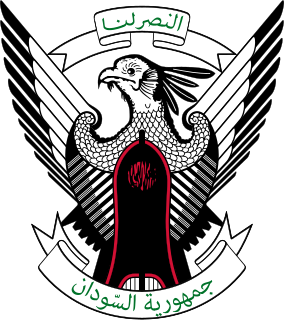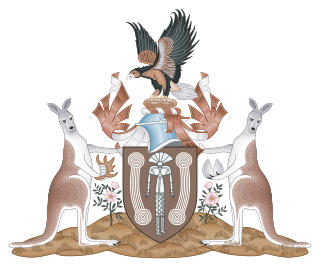
Politics of Malawi takes place in a framework of a presidential representative democratic republic, whereby the President of Malawi is both head of state and head of government, and of a multi-party system. Executive power is exercised by the government. Legislative power is vested in both the government and the National Assembly. There is a cabinet of Malawi that is appointed by the President of Malawi. The judiciary is independent of the executive and the legislature. The government of Malawi has been a multi-party democracy since 1994. The Economist Intelligence Unit has rated Malawi as "hybrid regime" in 2016.

The federal government of Nigeria is composed of three distinct branches: legislative, executive, and judicial, whose powers are vested by the Constitution of Nigeria in the National Assembly, the President, and the federal courts, including the Supreme Court, respectively.

Officially, the politics of Sudan takes place in the framework of a presidential representative democratic consociationalist republic, where the President of Sudan is head of state, head of government and commander-in-chief of the Sudanese Armed Forces in a multi-party system. Legislative power is vested in both the government and in the two chambers, the National Assembly (lower) and the Council of States (upper), of the bicameral National Legislature. The judiciary is independent and obtained by the Constitutional Court. However, following a deadly civil war and the still ongoing genocide in Darfur, Sudan was widely recognized as a totalitarian state where all effective political power was held by President Omar al-Bashir and the National Congress Party (NCP). However, al-Bashir and the NCP were ousted in a military coup which occurred on April 11, 2019. The government of Sudan is now led by the "Transitional Military Council".

The Government of the Hong Kong Special Administrative Region, commonly the Hong Kong Government or simplified as GovHK, refers to the executive authorities of the Hong Kong SAR. The Government is formally led by the Chief Executive of the SAR, who nominates its principal officials for appointment by the State Council of the People's Republic of China.
A by-law is a rule or law established by an organization or community to regulate itself, as allowed or provided for by some higher authority. The higher authority, generally a legislature or some other government body, establishes the degree of control that the by-laws may exercise. By-laws may be established by entities such as a business corporation, a neighborhood association, or depending on the jurisdiction, a municipality.

The Legislative Assembly for the Australian Capital Territory is the unicameral legislature of the Australian Capital Territory (ACT). It sits in the Legislative Assembly Building on Civic Square, close to the centre of the city of Canberra.

The Anglo-Egyptian Sudan was a condominium of the United Kingdom and Egypt in the eastern Sudan region of northern Africa between 1899 and 1956, but in practice the structure of the condominium ensured full British control over the Sudan with Egypt having local influence instead. It attained independence as the Republic of the Sudan, which since 2011 has been split into Sudan and South Sudan.

Islam is the largest religion in Sudan, and Muslims have dominated national government institutions since independence in 1956. According to UNDP Sudan, the Muslim population is 97%, including numerous Arab and non-Arab groups. The remaining 3% ascribe to either Christianity or traditional animist religions. Muslims predominate in all but Nuba Mountains region. The vast majority of Muslims in Sudan adhere to Sunni Islam of Maliki school of jurisprudence, deeply influenced with Sufism. There are also some Shia communities in Khartoum, the capital. The most significant divisions occur along the lines of the Sufi brotherhoods. Two popular brotherhoods, the Ansar and the Khatmia, are associated with the opposition Umma and Democratic Unionist Parties respectively. Only the Darfur region is traditionally lacking the presence of Sufi brotherhoods found in the rest of the country.
Law of the People's Republic of China, officially referred to as the Socialist legal system with Chinese characteristics, is the legal regime of China, with the separate legal traditions and systems of Mainland China, Hong Kong, and Macau.

The New York City Council is the lawmaking body of the City of New York. It has 51 members from 51 council districts throughout the five boroughs.

The Government of the Northern Territory of Australia, also referred to as the Northern Territory Government, is the Australian territorial democratic administrative authority of the Northern Territory. The Government of Northern Territory was formed in 1978 with the granting of self-government to the Territory. The Northern Territory is a territory of the Commonwealth of Australia, and the Constitution of Australia and Commonwealth law regulates its relationship with the Commonwealth.

This article discusses the history of Anglo-Egyptian Sudan during the history of Sudan from 1899 to 1955.
Legislation.gov.uk, formerly the UK Statute Law Database, is the official web-accessible database of the statute law of the United Kingdom, hosted by The National Archives. It contains all primary legislation in force as of 1991, and all primary and secondary legislation since that date; it does not include legislation which was fully repealed prior to 1991. The contents have been revised to reflect legislative changes up to 2002, with material that has been amended since 2002 noted in a table but not yet fully updated.
Transport law is the area of law dealing with transport. The laws can apply very broadly at a transport system level or more narrowly to transport things or activities within that system such as vehicles, things and behaviours. Transport law is generally found in two main areas —

The legal system of Afghanistan consists of Islamic, statutory and customary rules. It has developed over centuries and is currently changing in the context of the rebuilding of the Afghan state. The supreme law of the land is the Constitution of Afghanistan. In addition, there is complex legislation which stems from different historical periods. For instance, the so-called four volumes of civil law were developed on the basis of Egyptian models and promulgated in the time of the monarchy. Other legislation came into force under of President Daoud Khan, the Democratic Republic (1978-1992), the Mujahideen (1992-1996), the Taliban regime (1996-2001) and the current Islamic Republic of Afghanistan. Article 130 of the Afghan Constitution establishes that judges must apply the constitution and legislation and may only resort to Hanafi fiqh if a necessary legal rule cannot be found in the written laws.
In Malawi a system of Traditional Courts has been used for much of the twentieth century to mediate civil disputes and to prosecute crimes, although for much of the colonial period, their criminal jurisdiction was limited. From 1970, Regional Traditional Courts were created and given jurisdiction over virtually all criminal trials involving Africans of Malawian descent, and any appeals were directed to a National Traditional Court of Appeal rather than the Malawi High Court and from there to the Supreme Court of Appeal, as had been the case with the Local Courts before 1970.
Egypt is a source, transit, and destination country for women and children who are subjected to trafficking in persons, specifically forced labor and forced prostitution.

South Sudan is home to around 60 indigenous ethnic groups and 80 linguistic partitions among a 2016 population of around 12 million. Historically, most ethnic groups were lacking in formal Western political institutions, with land held by the community and elders acting as problem solvers and adjudicators. Today, most ethnic groups still embrace a cattle culture in which livestock is the main measure of wealth and used for bride wealth.

The Council of States was established in 2011 by the interim constitution of South Sudan 2011. It is one of the two chambers comprising the National Legislature of South Sudan.

The Judiciary of Malawi is the branch of the Government of Malawi which interprets and applies the laws of Malawi to ensure equal justice under law and to provide a mechanism for dispute resolution. The legal system of Malawi is based on English law, modified since 1969. The Constitution defines the judiciary as a hierarchical system of courts, with the highest court being a Supreme Court of Appeal, together with a High Court and a number of magistrates' courts.















